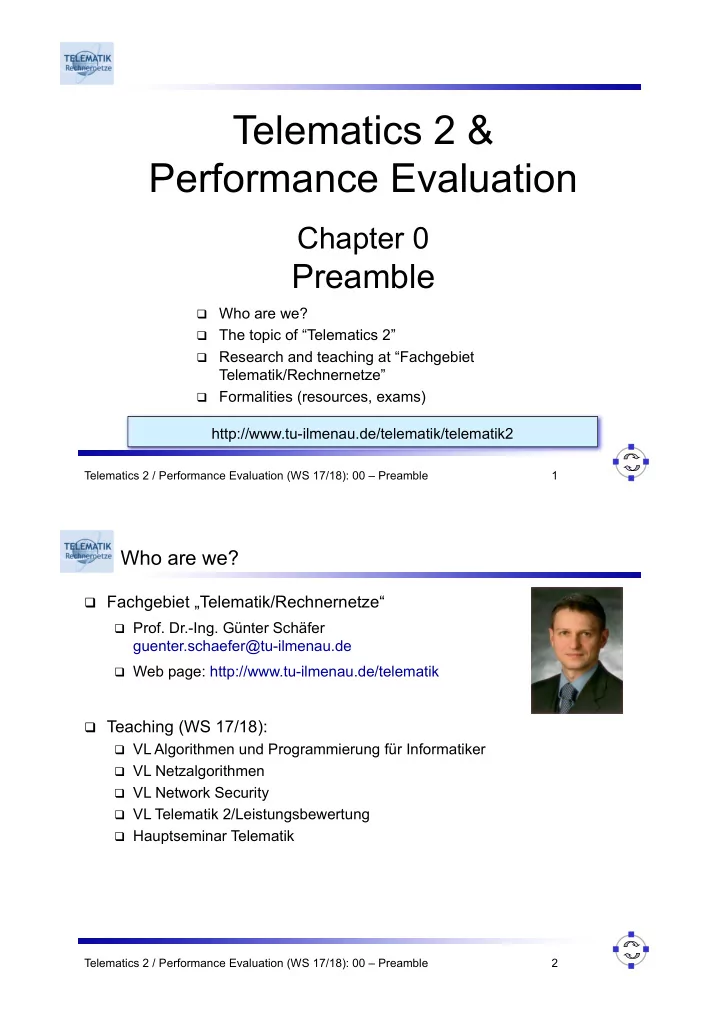

Telematics 2 & Performance Evaluation Chapter 0 Preamble q Who are we? q The topic of “Telematics 2” q Research and teaching at “Fachgebiet Telematik/Rechnernetze” q Formalities (resources, exams) http://www.tu-ilmenau.de/telematik/telematik2 Telematics 2 / Performance Evaluation (WS 17/18): 00 – Preamble 1 Who are we? q Fachgebiet „Telematik/Rechnernetze“ q Prof. Dr.-Ing. Günter Schäfer guenter.schaefer@tu-ilmenau.de q Web page: http://www.tu-ilmenau.de/telematik q Teaching (WS 17/18): q VL Algorithmen und Programmierung für Informatiker q VL Netzalgorithmen q VL Network Security q VL Telematik 2/Leistungsbewertung q Hauptseminar Telematik Telematics 2 / Performance Evaluation (WS 17/18): 00 – Preamble 2
Main Research Topics (of your Lecturer :o) q In general: architectures and protocols of communication systems q Structure, design, performance evaluation, implementation, … q For all types of communication: computer networks, voice communication, data & multimedia content, technical communication (control devices) q Special focus on security issues q More specifically: q Security requirements of communication services ■ Authenticity, integrity, confidentiality of peer entities and exchanged data q Security aspects of protocol mechanisms ■ What side “security relevant” side-effects are introduced by specific mechanisms? q How to protect communication infrastructures ■ Main issue: How to ensure availability of systems and offered services? Telematics 2 / Performance Evaluation (WS 17/18): 00 – Preamble 3 Topics of “Telematics 2” q Follow-up class of Telematics 1 q Telematics 1 treated: q Basics of getting information through a network q Protocol layers 1 to 7 q Network security basics q Telematics 2/Performance Evaluation will cover the following topics: q Multimedia Communications in the Internet q Internet QoS Architectures: IntServ/DiffServ q Multi Protocol Label Switching q Introduction to Performance Evaluation q Mathematical Basics for Performance Evaluation q Discrete Event Simulation q Queueing Theory q Evaluation of Complex Systems Telematics 2 / Performance Evaluation (WS 17/18): 00 – Preamble 4
If you would like to get a “hands-on” experience... q There is an additional course – entitled „ Simulative Evaluation of Protocol Functions” (project seminar, 4 SWS) – which is designed to give you a “hands-on” experience with network protocol functions and simulation studies: q Introduces a simulation environment and lets you add protocol functionality q Studied protocol functions: forwarding, routing, (interface queues), connection setup, error-, flow- and congestion control q Requires good programming skills q Knowledge of C++ is an asset (but not a pre-requisite) q Allows you to obtain in-depth knowledge of topics covered in Telematics I and the techniques and art of simulation studies – because afterwards “you did it!” :o) q Inscription and welcome lecture will take place today, 4pm, Z1020 http://www.tu-ilmenau.de/telematik/protsim Telematics 2 / Performance Evaluation (WS 17/18): 00 – Preamble 5 Example: Evaluation of TCP Congestion Control Performance Evaluation (WS 17/18): 00 – Preamble 6
Formalities – Resources q Slides are/will be available on the web site q There will be no script; q Secondary literature is sometimes beneficial (and will be cited) To give due credit where credit is due: q q The first slides we will use in this lecture have been prepared by the authors of [KR04] J. F. Kurose and K. W. Ross (besides maybe some additions, that I may introduce during the term) q Additional material (text, pictures, graphs, pictograms, etc.) will potentially be added from lectures given by Profs. Schiller, Carle, Karl at the Universities FU Berlin, Tübingen, Paderborn, as well as many other researchers all over the world q Anything with Markov chains is based on slides of Dr.-Ing. Werner Horn q Many thanks in advance to everybody, who contributed material that may be adopted during the course of this class Telematics 2 / Performance Evaluation (WS 17/18): 00 – Preamble 7 Formalities – Some Books Recommendations q J. F. Kurose & K. W. Ross, Computer Networking: A Top-Down Approach Featuring the Internet , 2012, 6th edition, Addison Wesley q Motivates why communication systems are built in a certain fashion by starting out from the applications that they should support (background reading, chapters on multimedia & QoS) Telematics 2 / Performance Evaluation (WS 17/18): 00 – Preamble 8
Formalities – Some Books Recommendations [La06] Averill M. Law, Simulation, Modeling and Analysis . 768 pp., McGraw-Hill Education, 2006. q General book on simulation, both excellent overview and in-depth treatment. Not oriented towards a single problem area. q If you want to buy only one book, get this one. Expensive, though. q Main source of information regarding discrete event simulation Telematics 2 / Performance Evaluation (WS 17/18): 00 – Preamble 9 Formalities – Some Books Recommendations q Larry Gonick, Woollcott Smith: Cartoon Guide to Statistics q William Morrow Paperbacks; Auflage: 4 ed. (14. Juli 1993) q About 15€ q 978-0062731029 q Statistics for statistic grouches Telematics 2 / Performance Evaluation (WS 17/18): 00 – Preamble 10
Formalities – Some Books Recommendations q Gunter Bolch, Stefan Greiner, Hermann de Meer, Kishor Shridharbhai Trivedi: Queueing Networks and Markov Chains: Modeling and Performance Evaluation with Computer Science Applications q John Wiley & Sons, 896 pages, May 2006 q 165€(!) q Covers most of 3 rd part of the lecture Telematics 2 / Performance Evaluation (WS 17/18): 00 – Preamble 11 Formalities – Some Books Recommendations [Ja91] R. Jain, The Art of Computer Systems Performance Analysis. Wiley, 1991. q Very good book on performance analysis in general q Treats simulation as well as mathematical tools (queuing theory) and experimental design q Examples heavily focus on computer systems and their architecture. q The treatment of simulation is not as thorough as in [La06], but also very good. Telematics 2 / Performance Evaluation (WS 17/18): 00 – Preamble 12
Formalities – Exam q There will be an oral exam: q Date, place, details to be clarified during exam registration period at the end of the term q No additional material (books, slides, etc.) needed for exam q Both lecture and exercise material are relevant for the exam Telematics 2 / Performance Evaluation (WS 17/18): 00 – Preamble 13
Recommend
More recommend